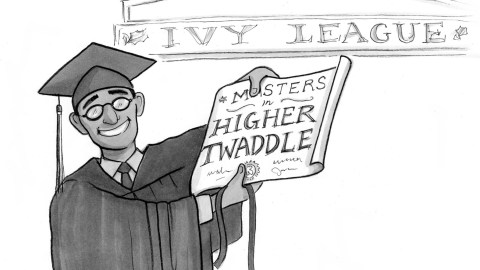Why Do Some of Our Best Minds Speak “Higher Twaddle”?

1. We teach “higher twaddle” to our best minds, says the ever insightful Marilynne Robinson. I think she has a point—many smart folk are now educated into error—but the problem is worse than she fears.
2. Robinson’s complaint that colleges teach students to “master… twaddle” and thereby “to think… badly,” focus mainly on the humanities, but worse twaddle is taught in fields whose ideas are less ivory-tower quarantined.
3. STEM disciplines teach a dazzling faith in “the data” and the pretty precision their tools promise. But they also risk a method-level fall for the “McNamara Fallacy,” and much math-swaddled twaddle.
4. Named for Robert McNamara’s metrics-obsessed management of the Vietnam War, this disastrous recipe (aka the “Quantitative Fallacy”) goes as follows: measure what data you easily can, then to handle what you can’t, arbitrarily estimate, or better, declare it minor, or nonexistent. And don’t adjust for exclusions, it fogs up the faux-clarity.
5. To see how far teaching and tech have spread McNamara’s number-struck folly, consider these cases.
6. Experts who excel at seeing only what can be “read on a spreadsheet” often skip other plainly important factors, to the point that great “companies can be wrecked by idiots with MBAs” (Rory Sutherland).
7. Business schools preach the same spreadsheet-blinder metric-mad mentality, which can sometimes encourage “immoral profit strategies” (Duff McDonald) and the ruthless “financialization” numbers game behind “how Wall Street destroyed Main Street” (Rana Foroohar).
8. Algorithms enact McNamara-on-steroids logic, vastly amplifying techno-twaddle’s reach (see Cathy O’Neil’s “Weapons of Math Destruction”).
9. Much economics (the world’s operating system) builds on textbook McNamara-moves. Paradoxically, preferring highly precise methods, but used in a way that ensures they’ll almost always be widely wrong. Economics “equation filters” away whatever won’t squeeze into its algebra, then fails to adjust for exclusions (see “Few Maximize. Most Muddle”)
10. Even babies know what many educated experts ignore: People aren’t biological billiard balls. Toddlers use different thinking tools for objects versus agents, but many math-manacled minds use the same treasured nerd tools (algebra, stats, and data) for all pattern types.
11. Amazingly, the well-educated are taught to characterize behaviors known to be collectively self-destructive as “rational,” to profit by preying on and damaging what they (and their communities) need to survive.
12. And many smart folk are educated into ignoring how communities work by “social contract” thinking, which, despite its shiny logic-like appeal, is self-evidently anthropologically incoherent. Hume called it “implausibly individualistic” (it’s really more an asocial contraction than a realistic contract).
13. Examples abound, but the main point here is that seductive math-masked “higher twaddle” is worse than garden-variety bullshit.
14. Besotted logic-over-loving nerds can suffer “theory [or tool] induced blindness” that can cause great harms (e.g. when algorithm-wielding techies “disrupt” the infrastructure democracy needs).
15. It’ll take many emperor’s-new-clothes moments to reveal all the naked folly, math-wrapped myopia, and data-driven drivel that can parade as intelligence in these highly techno-twaddle-ridden times.
Illustration by Julia Suits, The New Yorker cartoonist & author of The Extraordinary Catalog of Peculiar Inventions





